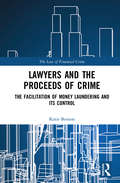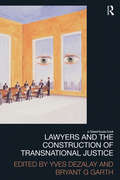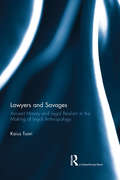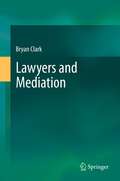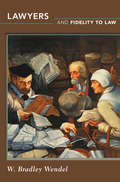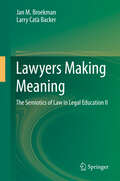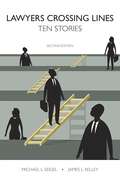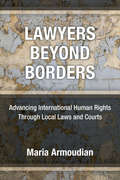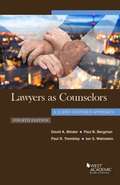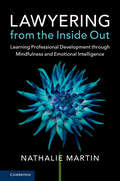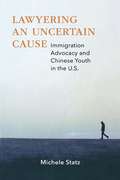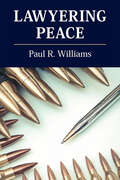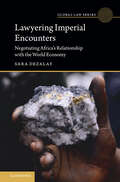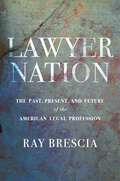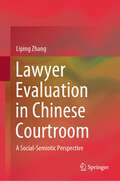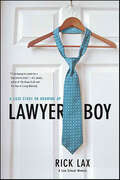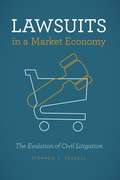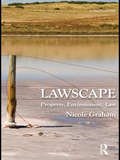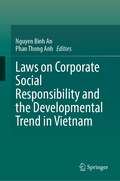- Table View
- List View
Lawyers and the Proceeds of Crime: The Facilitation of Money Laundering and its Control (The Law of Financial Crime)
by Katie BensonThe role played by legal professionals in the laundering of criminal proceeds generated by others has become a priority concern for authorities at national and international levels. This ground-breaking book presents an in-depth empirical analysis of the nature of lawyers’ involvement in the facilitation of money laundering and its control through criminal justice and regulatory mechanisms. It is based on qualitative research combining analysis of cases of lawyers convicted of money laundering offences with interviews with criminal justice practitioners, members of professional and regulatory bodies and practising solicitors, and analysis of relevant national and international legislative and regulatory frameworks. The book demonstrates the complex and diverse nature of lawyers’ involvement in laundering activity, and shows that their actions and the decisions they take must be understood in relation to the specific situational contexts in which they occur. It provides significant new insights into the criminal justice and regulatory response to professional facilitation of money laundering in the UK, raising questions about the effectiveness and appropriateness of the response and the challenges involved. The book develops a framework for future research and analysis in this area, and proposes a range of potential strategies for controlling the facilitation of money laundering. Lawyers and the Proceeds of Crime is essential reading for those researching money laundering, white-collar crime or organised crime, and for practitioners and policy makers concerned with preventing the facilitation of money laundering.
Lawyers and the Construction of Transnational Justice (Law, Development and Globalization)
by Yves Dezalay Bryant G GarthFirst Published in 2012. Routledge is an imprint of Taylor & Francis, an informa company.
Lawyers and Savages: Ancient History and Legal Realism in the Making of Legal Anthropology
by Kaius TuoriLegal primitivism was a complex phenomenon that combined the study of early European legal traditions with studies of the legal customs of indigenous peoples. Lawyers and Savages: Ancient History and Legal Realism in the Making of Legal Anthropology explores the rise and fall of legal primitivism, and its connection to the colonial encounter. Through examples such as blood feuds, communalism, ordeals, ritual formalism and polygamy, this book traces the intellectual revolution of legal anthropology and demonstrates how this scholarship had a clear impact in legitimating the colonial experience. Detailing how legal realism drew on anthropology in order to help counter the hypothetical constructs of legal formalism, this book also shows how, despite their explicit rejection, the central themes of primitive law continue to influence current ideas – about indigenous legal systems, but also of the place and role of law in development. Written in an engaging style and rich in examples from history and literature, this book will be invaluable to those with interests in legal realism, legal history or legal anthropology.
Lawyers and Mediation
by Bryan ClarkThis book charts the historical and current interaction between lawyers and mediation in both the common law and civil law world and analyses a number of issues relevant to lawyers' part in the process. Lawyers have in the past and continue to play many roles in the context of mediation. While some are champions for the process, many remain on the fringes and apathetic, while others are openly sceptical or even anti-mediation in their stance. Yet others may have embraced mediation but, it is argued, for cynical, disingenuous reasons. By reviewing existing empirical evidence on lawyers' interactions with mediation and by examining historical and current trends in lawyers' dalliance with mediation, this book seeks to shed new light on a number of related issues, including: lawyers' resistance to mediation; lawyers' motives for involvement with mediation; the appropriateness of lawyers acting as mediators and party representatives; and the impact that both lawyers and the increasing institutionalisation of mediation have had on the normative form of the process, as well as the impact that mediation experience heralds for lawyers and legal systems in general.
Lawyers and Fidelity to Law
by W. Bradley WendelEven lawyers who obey the law often seem to act unethically--interfering with the discovery of truth, subverting justice, and inflicting harm on innocent people. Standard arguments within legal ethics attempt to show why it is permissible to do something as a lawyer that it would be wrong to do as an ordinary person. But in the view of most critics these arguments fail to turn wrongs into rights. Even many lawyers think legal ethics is flawed because it does not accurately describe the considerable moral value of their work. In Lawyers and Fidelity to Law, Bradley Wendel introduces a new conception of legal ethics that addresses the concerns of lawyers and their critics alike. Wendel proposes an ethics grounded on the political value of law as a collective achievement that settles intractable conflicts, allowing people who disagree profoundly to live together in a peaceful, stable society. Lawyers must be loyal and competent client representatives, Wendel argues, but these obligations must always be exercised within the law that constitutes their own roles and confers rights and duties upon their clients. Lawyers act unethically when they treat the law as an inconvenient obstacle to be worked around and when they twist and distort it to help their clients do what they are not legally entitled to do. Lawyers and Fidelity to Law challenges lawyers and their critics to reconsider the nature and value of ethical representation.
Lawyers Making Meaning....
by Jan M. Broekman Larry Catà BackerThis book present a structure for understanding and exploring the semiotic character of law and law systems. Cultivating a deep understanding for the ways in which lawyers make meaning--the way in which they help make the world and are made, in turn by the world they create --can provide a basis for consciously engaging in the work of the law and in the production of meaning. The book first introduces the reader to the idea of semiotics in general and legal semiotics in particular, as well as to the major actors and shapers of the field, and to the heart of the matter: signs. The second part studies the development of the strains of thinking that together now define semiotics, with attention being paid to the pragmatics, psychology and language of legal semiotics. A third part examines the link between legal theory and semiotics, the practice of law, the critical legal studies movement in the USA, the semiotics of politics and structuralism. The last part of the book ties the different strands of legal semiotics together, and closely looks at semiotics in the lawyer's toolkit--such as: text, name and meaning.
Lawyers Crossing Lines: Ten Stories
by James Kelley Michael SeigelLawyers Crossing Lines is a collection of true stories about lawyers from all segments of the legal profession who transgressed ethical boundaries. Most of them ended up being sanctioned by their state Bar, sued for malpractice, prosecuted, or some combination of all three. All of the cases are rich in detail, many are bizarre, and in a few the attorney's conduct is so outrageous as to stretch the reader's credulity. Each tale is followed by comments and questions designed to explore the issues in greater depth. This diminutive but captivating volume is intended as a supplemental text for students in professional responsibility courses at American law schools. It can also be used as the foundation for an advanced seminar in ethics. It is based on the proposition that, although the rules of professional responsibility are, of course, of supreme importance, sometimes the study of them can be monotonous and dry. More important, students―none of whom have been in law practice and most of whom have never been out in the working world―often find it hard to believe that the rules can be so easily and egregiously broken. These real world scenarios bring the ethical quandaries faced in everyday legal practice to life. The stories come from all segments of the legal profession and make fascinating and memorable reading. No other book on the market takes this narrative approach, making this an important and unique contribution to the field.
Lawyers Beyond Borders: Advancing International Human Rights Through Local Laws and Courts
by Maria ArmoudianDespite international conventions and human rights declarations, millions of people have suffered and continue to suffer torture, slavery, or violent deaths, with no remedy or recourse. They have fallen, in essence, “below the law,” outside of law’s protection. Often violated by their own governments, sometimes with support from transnational corporations, or nations benefiting from human rights violations, how can these victims find justice? Lawyers Beyond Borders reveals the inner workings of the advances and retreats in the quest for redress and restoration of human rights for those whom international legal-political systems have failed. The process of justice begins in the US, with a handful of human rights lawyers steeped in the American tradition of advancing civil rights through civil litigation. As the civil rights movement gained traction and an ample supply of lawyers, this small cadre turned their attention toward advancing international human rights, via the US legal system. They sought to build another piece of the rights revolution, this time for survivors of egregious human rights violations in faraway lands. These cases were among the most unlikely to be slated for victory: The abuses occurred abroad; the victims are aliens, usually with few, if any, resources; the perpetrators are politically powerful, resourced, and well connected, often members of governments, militaries, or multinational corporations. The legal and political systems’ structures are mostly stacked against these survivors, many who bear the scars of trauma and terror. Lawyers Beyond Borders is about agency. It is about how, in the face of powerful interests and seemingly insurmountable obstacles—political, psychological, economic, geographical, and physical—a small group of lawyers and survivors navigated a terrain of daunting barriers to begin building, case-by-case, new pathways to justice for those who otherwise would have none.
Lawyers As Counselors, A Client-centered Approach (Coursebook)
by Paul Bergman Paul Tremblay David Binder Ian WeinsteinPart One examines problems clients usually bring and covers the necessity of a clientcentered approach. Part Two presents the questioning and listening skills that attorneys need to gather information while encouraging active client participation. Part Three explains how to develop a story from the client's perspective, then to probe it for evidence in light of individual factual propositions; it also focuses on transactional matters, identifying the type of data lawyers need to elicit in almost all business dealings. Part Four examines the counseling process and how to help clients make decisions, which reflect their legal objectives and values.
Lawyering from the Inside Out: Learning Professional Development Through Mindfulness And Emotional Intelligence
by Nathalie MartinLaw is a varied, powerful, and highly rewarding profession. Studies show, however, that lawyers have higher rates of alcoholism, divorce, and even suicide than the general population. Stress creates these poor outcomes, including the stress of dealing with other people's problems all day, the stress of spending excessive amounts of time at work, and the stress of being disconnected to what is most meaningful in life. Through mindfulness and emotional intelligence training, lawyers can improve focus, get more work done in less time, improve their interpersonal skills, and seek and find work that will make their lives more meaningful. This book is designed to help law students and lawyers of all experience levels find a sustainable and meaningful life in the field of law. This book includes journaling and other interactive exercises that can help lawyers find peace, focus, meaning, and happiness over a lifetime of practicing law.
Lawyering for the Rule of Law
by Yoav DotanLawyering for the Rule of Law introduces a new model of government lawyering in which government lawyers function as an ancillary mechanism that enables the court to expand its influence on policy-making within the political branches by forming out-of-court settlements. It discusses the centrality of government lawyers with regard to judicial mobilization and the enforcement of social reforms through adjudication, and sheds light on particular functions of government lawyers as adjudicators and facilitators of institutional arrangements. It also discusses the ethical and professional dilemmas of government lawyers in judicial review and the relationship between lawyers' professional morality and outcomes in litigation.
Lawyering an Uncertain Cause: Immigration Advocacy and Chinese Youth in the US
by Michele StatzEach year, a number of youth who migrate alone and clandestinely from China to the United States are apprehended, placed in removal proceedings, and designated as unaccompanied minors. These young migrants represent only a fraction of all unaccompanied minors in the US, yet they are in many ways depicted as a preeminent professional and moral cause by immigration advocates.In and beyond the legal realm, the figure of the "vulnerable Chinese child" powerfully legitimates legal claims and attorneys' efforts. At the same time, the transnational ambitions and obligations of Chinese youth implicitly unsettle this figure. Youths' maneuvers not only belie attorneys' reliance on racialized discourses of childhood and the Chinese family, but they also reveal more broad uncertainties around legal frameworks, institutional practices, health and labor rights—and cause lawyering itself.Based on three years of fieldwork across the United States, Lawyering an Uncertain Cause is a novel study of the complex and often contradictory rights, responsibilities, and expectations that motivate global youth and the American attorneys who work on their behalf.
Lawyering an Uncertain Cause: Immigration Advocacy and Chinese Youth in the US
by Michele StatzEach year, a number of youth who migrate alone and clandestinely from China to the United States are apprehended, placed in removal proceedings, and designated as unaccompanied minors. These young migrants represent only a fraction of all unaccompanied minors in the US, yet they are in many ways depicted as a preeminent professional and moral cause by immigration advocates. In and beyond the legal realm, the figure of the "vulnerable Chinese child" powerfully legitimates legal claims and attorneys' efforts. At the same time, the transnational ambitions and obligations of Chinese youth implicitly unsettle this figure. The maneuvers of these youth not only belie attorneys' reliance on racialized discourses of childhood and the Chinese family, but they also reveal more broad uncertainties around legal frameworks, institutional practices, health and labor rights—and cause lawyering itself. Based on three years of fieldwork across the United States, Lawyering an Uncertain Cause is a novel study of the complex and often contradictory rights, responsibilities, and expectations that motivate global youth and the American attorneys who work on their behalf.
Lawyering Skills and the Legal Process
by Caroline Maughan Julian WebbThis book develops students' understanding and practice of client interviewing, writing and drafting, negotiation and advocacy in the context of extensive research in the legal profession and the civil and criminal justice systems. It emphasizes the extent to which lawyering is a dynamic process, determined by a variety of legal, business and ethical considerations. It encourages students to develop a critical and reflective approach geared to developing their abilities to manage this dynamic environment.
Lawyering Peace
by Paul R. WilliamsIn all but the rarest circumstances, the world's deadly conflicts are ended not through outright victory, but through a series of negotiations. Not all of these negotiations, however, yield a durable peace. To successfully mitigate conflict drivers, the parties in conflict must address a number of puzzles, such as whether and how to share and/or re-establish a state's monopoly of force, reallocate the ownership and management of natural resources, modify the state structure, or provide for a path toward external self-determination. Successfully resolving these puzzles requires the parties to navigate a number of conundrums and make choices and design mechanisms that are appropriate to the particular context of the conflict, and which are most likely to lead to a durable peace. Lawyering Peace aims to help future negotiators build better and more durable peace agreements through a rigorous examination of how other parties have resolved these puzzles and associated conundrums.
Lawyering Imperial Encounters: Negotiating Africa's Relationship with the World Economy (Global Law Series)
by Sara DezalayLawyering Imperial Encounters revisits the relationship between the African continent and global capitalism since the 19th century Scramble. Focused on sites of imperial encounters – in London, Paris, Abidjan, Bujumbura, Kinshasa, Johannesburg or the Hague, it provides an unprecedented account of the correlation between the legacy of legal imperialism and British hegemony, and the uneven and unequal expansion of finance and global justice in the current rush for Africa's 'green' minerals. Tracking the role played by legal intermediaries to negotiate and justify Africa's practical and symbolic subaltern position in the global economy, it demonstrates the interconnectedness between political, legal and economic change in capitalism's cores and its so-called peripheries. Embracing the global turn in sociology, history and legal scholarship, it rubs against the functionalist account of global value chains as engines of development. It also constitutes a powerful postcolonial critique of law's double-bind - as both enabler and bulwark against domination.
Lawyered To Death: a Karen Hayes mystery
by Michael BiehlThe successful CEO of a Midwest hospital, begins an affair with a hospital receptionist, unaware that she and her husband, are setting him up for an embarrassing and costly sexual harassment claim
Lawyer Nation: The Past, Present, and Future of the American Legal Profession
by Ray BresciaExplores the critical role that American lawyers have played since the nation’s founding and what the future holds for the professionThe American legal profession faces significant challenges: the changing nature of work in the wake of the COVID-19 pandemic; calls for greater racial and gender justice; threats to democracy; the inaccessibility of legal services for the majority of Americans; the risk of obsolescence owing to the emergence of new technologies; and the disaffection many lawyers feel toward their work. Ambitious in its scope yet straightforward in its approach, Lawyer Nation seeks to address these crises by offering a path forward for the legal profession. Ray Brescia provides concrete ideas for transforming law into a field whose services are accessible, egalitarian, and viable in the long term. Further, he addresses how the profession can improve so that the health of its practitioners is not compromised in the process. If the legal profession does not respond to its crises in an effective way, he argues, the dysfunction and unfairness plaguing the legal world will deepen. This is an unprecedented opportunity for the world of law to reimagine its future in way that honors its highest ideals: preserving the rule of law, protecting individual liberty, and addressing social inequality in all of its forms.
Lawyer Evaluation in Chinese Courtroom: A Social-Semiotic Perspective
by Liping ZhangThis book focuses on the speech style of lawyer talk in contemporary Chinese courtrooms. The topic is intriguing to readers who may wonder how lawyers compete with their opposing counterparts in an adversarial trial system in China. The legal tradition in Confucianism, which advocates harmony in interpersonal relationships, has historically guided the practice of law in China. The book analyses how lawyers manage to compete in this system. Applying the social semiotic view of language in the Hallidayian sense, specifically systemic functional linguistics and its appraisal theory, this study interprets the subjectivity of legal language by lawyers. The speech style in legal argument presentation is described as 'rational'. The exploration of the rational speech style of lawyers is a theoretical and discursive topic. It draws upon Habermasian philosophy of intersubjectivity in legal argumentation and considers the cultural and legal contexts of China as contextual constraints. The keyconstruct of lawyer evaluation is fully captured in this discussion. As a linguistic phenomenon and unit of analysis, discourse can be examined both within local clauses and in larger stretches of talk beyond clauses. Additionally, it serves as an effective means for constructing a rational speech style for lawyers. Most importantly, discourse is a discursive act that negotiates legal arguments in the dynamic speech exchanges of a court trial, which is embedded in a wider social and cultural context. The book showcases instances of lawyer talk in well-documented trials in China and offers a good opportunity for readers to gain a general understanding of courtroom discourse in the Chinese context. It introduces readers with special interests in legal language and the law to the solidarity dimension of legal language and arguments, an alternative to the confrontational or hostile lawyer talk in trials in countries with a common-law system. The analysis presented is refined and the language used is clear, concise, and objective.
Lawyer Boy: A Case Study on Growing Up
by Rick LaxAfter college, Rick Lax moved back into his parents' house. The closest thing he had to a job was eating his parents' food, sitting on his parents' couch, and watching The Price is Right. An amateur magician, he spent the rest of his time practicing card tricks and rope tricks. And though he could tie four different slipknots, the necktie posed some difficulties.Rick's father, a successful Michigan attorney, told Rick it was time to move out and enter the real world. Rick certainly wasn't going to get a job, so he went to law school instead.This is the story of Rick's journey from childhood to lawyerhood.In Lawyer Boy, Rick uses the skills he developed as a magician to succeed in class, and learns how to become a lawyer without becoming his father. His journey through law school was exhausting, exciting, and infuriating, and, the way he tells it, so funny it's criminal.
Lawyer Barons
by Lester BrickmanThis book is a broad and deep inquiry into how contingency fees distort our civil justice system, influence our political system, and endanger democratic governance. Contingency fees are the way personal injury lawyers finance access to the courts for those wrongfully injured. Although the public senses that lawyers manipulate the justice system to serve their own ends, few are aware of the high costs that come with contingency fees. This book sets out to change that, providing a window into the seamy underworld of contingency fees that the bar and the courts not only tolerate but even protect and nurture. Contrary to a broad academic consensus, the book argues that the financial incentives for lawyers to litigate are so inordinately high that they perversely impact our civil justice system and impose other unconscionable costs. It thus presents the intellectual architecture that underpins all tort reform efforts.
Lawsuits in a Market Economy: The Evolution of Civil Litigation
by Stephen C. YeazellSome describe civil litigation as little more than a drag on the economy; Others hail it as the solution to most of the country’s problems. Stephen C. Yeazell argues that both positions are wrong. Deeply embedded in our political and economic systems, civil litigation is both a system for resolving disputes and a successful business model, a fact that both its opponents and its fans do their best to conceal. Lawsuits in a Market Economy explains how contemporary civil litigation in the United States works and how it has changed over the past century. The book corrects common misconceptions—some of which have proved remarkably durable even in the face of contrary evidence—and explores how our constitutional structure, an evolving economy, and developments in procedural rules and litigation financing systems have moved us from expecting that lawsuits end in trial and judgments to expecting that they will end in settlements. Yeazell argues that today’s system has in some ways overcome—albeit inconsistently—disparities between the rich and poor in access to civil justice. Once upon a time, might regularly triumphed over right. That is slightly less likely today—even though we continue to witness enormous disparities in wealth and power. The book concludes with an evaluation of recent changes and their possible consequences.
Lawscape: Property, Environment, Law
by Nicole GrahamLawscape: Property, Environment, Law considers the ways in which property law transforms both natural environments and social economies. Addressing law's relationship to land and natural resources through its property regime, Lawscape engages the abstract philosophy of property law with the material environments of place. Whilst most accounts of land law have contributed cultural analyses of historical and political value predominantly through the lens of property rights, few have contributed analyses of the natural consequences of property law through the lens of property responsibilities. Lawscape does this by addressing the relationship between the commodification of land, instituted in and by property law, and ecological and economic histories. Its synthesis of property law and environmental law provides a genuinely transdisciplinary analysis of the particular cultural concepts and practices of land tenure that have been created, and exported, across the globe.
Laws that Changed America
by Jules Archer Brianna DuMontJules Archer begins with laws that opened up America—public lands and homesteading—and continues with banking, the Bill of Rights, subversion and sedition, foreign policy. Natural resources, labor, business, education and welfare, farming, Prohibition, the New Deal, the draft and G. I. Bills, slavery and civil rights. Archer chronicles the history of laws in America.Each chapter opens with a dramatic incident, and then develops the laws relating to it. Brisk up-to-date, authoritative, informative—this volume will be valuable a supplementary reading in the classroom, as well as a welcome addition to libraries across the country. Readers of all ages will find this an exciting approach to what is usually considered difficult material.
Laws on Corporate Social Responsibility and the Developmental Trend in Vietnam
by Nguyen Binh An Phan Thong AnhThis book examines the law and its development trends in the area of corporate social responsibility (CSR) in Vietnam. It is an important reference in implementing the requirements of CPTPP and EVFTA in Vietnam, and it is also very important in improving the legal framework in Vietnam to comply with international standards, especially in the areas of labor, environment and consumer protection, and in raising awareness of CSR among Vietnamese companies. Many articles in this book analyze and assess the legal status of CSR, thus providing a number of constructive suggestions for improving the relevant laws in Vietnam. Corporate social responsibility is not only the contribution of corporate philanthropy to society, but also the compliance of companies with international standards and national laws in the fields of labor, environment, investment, labor security, social security, etc. Against the backdrop of Vietnam's growing international integration, the requirement of corporate social responsibility has been, and continues to be, paramount in business activities. It is not only a need at the enterprise level, but is also related to the internationalization of international standards and the improvement of national laws on CSR.
